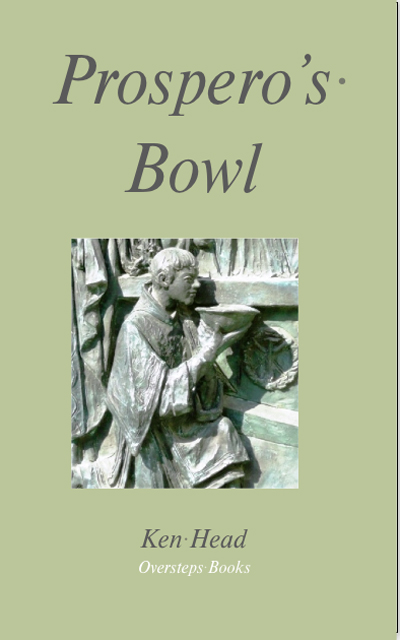Although Ken Head’s poems have appeared widely in print magazines, online and in various chapbooks, Prospero’s Bowl is a long overdue full collection. In ‘Passing Through’, its opening poem, Head’s strengths as a poet are immediately apparent. Within the compass of a blank sonnet, a form he frequently uses to good effect, we accompany the poem’s protagonist on an early morning walk. Matter of fact and self-effacing, its opening lines set the scene with a minimum of fuss: ‘In the morning early he walked down / the mountainside from the old village.’ Soon, however, we are drawn on as precisely observed details accumulate:
The narrow donkey track, winding serpentine
and stony across the slope of the land,
kept the glitter of the sea below dark cliffs
always in his eyes. He breathed in thyme
and the scent of fresh-cut grass where men
with scythes, who nodded quiet greetings
as he passed, had cleared the path while
he was still asleep.
Mirroring the twists and turns of the narrow path, Head’s sinuous syntax is also sustained by its musicality and the rhythms of his language. Reading the poem aloud, one admires its cadences and the texture of its sounds: the contrast between long and short vowels, the repetition of sibilants and liquids. Frequently inspired by landscapes at home and abroad, many of the poems in Prospero’s Bowl meditate upon mankind’s relationship with the natural world; and this is a theme which gives the poet plenty of scope to indulge his philosophical bent and to create a poetry of perception that is, at times, reminiscent of the work of that fine and somewhat undervalued poet Charles Tomlinson. In ‘By Haweswater’ Head captures aural impressions and beautifully evokes the quality of a silence: ‘That there’s no voice, not even birdsong, is what he notices, / that the silence remains untouched by any of the noise / he carries with him.’ In this poem, consisting of two capacious stanzas composed in long loping lines of anything up to sixteen syllables, Head’s technical skill is impressive, but even more so is a Wordsworthian reflectiveness as he moves beyond the limits of mere observation:
Years ago, he wouldn’t have, but time’s more powerful now
and landscapes like this, so filled with emptiness,
as mysterious as death. No compromise, they say, keep moving.
The stoicism that is hinted at here is given further expression in ‘Stepping Off’, a tour de force consisting of three fifteen line stanzas depicting a bleak landscape shrouded in fog, a harsh world where men have struggled to survive:
Making and mending,
hauling supplies, turning backbreaking
labour into food, must all have been grist
to the mill in the battle against failure
of belief, a deal with the gods that might make
the world more knowable, less pitilessly
harsh.
Equally impressive is ‘Something to Measure against’, a study of poor villagers who eke out their living in a parched landscape where water has to be rationed: ‘No water now / until late afternoon and nothing to be done / but study patience’; while in ‘Along Ashwell Road’, where he describes some woodland, ‘shawled … / in separation like a gypsy woman’, the harshness of nature is expressed in a more demotic terms: ‘bleak as buggery on windy nights.’
Having from the outset shown his ability to encapsulate a landscape or scene, Head proceeds, as his collection unfolds, to widen his historical scope and geographical range. ‘Iron in the Soul’, a sequence of six unrhymed sonnets, has an epigraph taken from Marilynne Robinson’s novel Gilead: ‘ History could make a stone weep’. In its opening section we are presented with a landscape in summer and the fair weather walkers who treat it with scant regard: ‘At the top, they leave the litter from their picnics / and piles of dog crap inside plastic bags,’ Soon, however, we find ourselves in a less familiar world where a warrior is ‘testing the new grip / on his battle axe’, a place where ‘thick, white fog’ does not merely make high ground uninviting for hikers but gives cover to raiders. The sixth and final section is an eloquent peroration on death and transience behind which one senses, perhaps, the ghost of Ecclesiastes.
What we sweated to make
of oak, with iron and stone to bind it fast
against the years, lasted not much longer
than a leaf will feed a moth.
‘Staying Power’ the collection’s second major sequence, consisting this time of ten sonnets, is set in Singapore’s Chinatown. Here the poet’s eye roves like the lens of a photojournalist’s camera. As elsewhere in the collection there is again a realization that the present is always informed by what lies behind it, that ‘memories don’t vanish like graffiti / under coats of paint. In ‘2: Shadow Play’ Head evokes a past that seems colourful, almost lurid: ‘opium fortunes / lost in fires, the gold, the gambling dens, young girls shipped over in boatloads / to work the brothels.’ However, in ‘3: Chinese Whispers’ we are enjoined not to romanticise the past: ‘Don’t let all that tourist bullshit fool you, / there are still hungry ghosts in every house.’
In this collection there are so many fine poems that in the space available one can only finish by mentioning a few more personal favourites: ‘Canal: 2011’ with its ‘silty ghosts / of the men who died digging it’; ‘Inside the Frame’ a marvellously sustained meditation on an interior by Benito Barrueta’; or the skilful reportage of ‘Compliance’ and ‘On The Road from Nam Dinh’, his poem in memory of Robert Capa. Prospero’s Bowl is a richly textured and deeply satisfying collection. Like the artefact for which it is named, it is finely crafted, inspired, and has deep roots in history and the natural world.
Ken Head’s Prospero’s Bowl is published by Oversteps Books. 2013. ISBN: 9781906856410. £8 Buy your copy here

